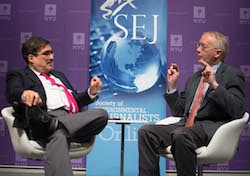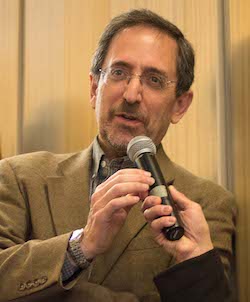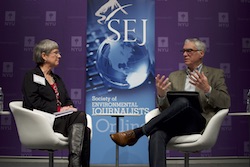SEJournal Online is the digital news magazine of the Society of Environmental Journalists. Learn more about SEJournal Online, including submission, subscription and advertising information.
SEJ News: Veteran Reporters Say Ignore the Noise, and Localize
By Izzie Ramirez
 |
| Seth Borenstein of the Associated Press and event co-organizer, left, led pointed questioning of Myron Ebell, the Trump administration official who spearheded the transition for the U.S. EPA. Photo: Dale Willman/SEJ |
Environmental reporters must set aside the "noise" of the new Trump administration as they focus on the actual impacts of specific environment and energy policies. That was one of the main takeaways of a day-long "Reporter's Primer" event put together by Society of Environmental Journalists members in Washington, D.C., on Feb. 4.
The program, sponsored with New York University’s Washington, D.C. center, brought together as many as 75 journalists and others to hear experts speak on issues ranging from climate to clean water.
“Right now, for those of us who are trying to report on this, the noise of the transition is enormous,” said veteran journalist Andrew Revkin, who recently moved to ProPublica after years of reporting and blogging for the New York Times. “You have to compartmentalize and look at the transitions and then look at policy that comes out of it.”
Long-time Dallas Morning News reporter Randy Loftis, now with Texas Climate News, had a similar take: “The more I do this, the less interested I am in covering debates and arguments,” Loftis said. “I’ve got my own orientation towards reporting hard facts. Strip the political part of it as much as possible.”
Loftis also suggested reporters point to the consequences of policy without taking a “doomsday” approach. “I would like to see more coverage of reality on the ground. Maybe a little less theory, maybe a little more ‘guess what?’ kind of coverage.”
He added: “There’s a lot of data out there that’s robust and being ignored. Just lay it out the same way you would a budget for the city council story.”
 |
| Andrew Revkin of ProPublica during a Q&A with expert panelists. Photo: Dale Willman/SEJ |
Sarah Terry-Cobo, a senior reporter for The Journal Record in Oklahoma City, agreed that “local impact” journalism is the way to bring environmental issues to the average reader, especially with polarizing issues like global warming.
“They [readers] recognize floods. They recognize droughts. They recognize more extremes,” she said, adding that these were stories with real effects that people couldn’t ignore, “regardless if they want to debate about climate change.”
Such local impact storytelling can also lend itself to accountability journalism, suggested Revkin. He said journalists need to be honest about the drivers about climate, including people’s own actions.
“Everyone here has talked about vulnerability to the climate system and that is a profound story,” Revkin said. “But the accountability for why people are getting in harm’s way is so much broader and also actionable in real time.”
Agreeing that the Trump administration required real nimbleness to cover was Associated Press White House reporter Jill Colvin. “We’re all trying to get a handle on the processes they’re going to be using,” Colvin explained. “We’re trying to figure out: Which of those are going to move forward? Who in the administration is pushing what? And do they have power?”
Part of the challenge is how quick President Donald Trump himself is to pivot in his views. “If he has somebody in front of him that makes an argument about something that feels compelling to him,” Colvin said, “we’ve seen that he will pick up those talking points and start repeating them. We all have to watch pretty closely who is in the room with him and who he is meeting with.”
Key to predicting Trump policy?
“In the room” is certainly a suitable description of one of the SEJ gathering’s headliners — Myron Ebell, who led the Trump transition team on the U.S. Environmental Protection Agency.
Although Ebell, a director at the conservative Competitive Enterprise Institute think tank, no longer has a formal role in the Trump administration, he did suggest how reporters could get a clearer view of the Trump environment and energy policy.
“What will President Trump and his EPA do? The place to look is not at his transition team, but to look at what he said during the campaign,” argued Ebell. He pointed at two or three major policy speeches Trump gave starting last May on energy and environmental issues. “I think if you look into those speeches you will see what he’s going to do.”
 |
| Event co-organizer Cheryl Hogue of Chemical & Engineering News, left, spoke with former EPA official Bob Perciasepe about his perspective from inside the agency. Photo: Dale Willman/SEJ |
Ebell largely sidestepped questions from conference co-organizer Seth Borenstein of the Associated Press about the details of the transition plan. He did say, however, that the 75-page-long EPA transition plan included 42 “distinct promises” that were geared less toward long-term policy and more toward rapid action.
Ebell also noted that the transition team focused little on legislative initiatives with Congress, which he characterized as prone to “inaction,” but instead on ways to “undo things done in the past and mostly by the Obama administration.”
Top priorities include reworking of Obama climate policy as expressed in the Clean Power Plan and international climate deals. In addition, Ebell said the aim was to undo obstacles to energy production, particularly on federal lands, in order to make the United States “the world’s energy superpower.”
Regarding steep cuts being rumored at EPA, Ebell appeared to confirm a target cut of the agency’s funding by half to two-thirds. Such a dramatic defunding was justified, in part, Ebell said, because “EPA has been very successful” at fixing many of the problems it was chartered to address and now, in the face of the need to cut federal spending overall, it could “devolve a lot of its work to state agencies” where problems are increasingly localized.
Costs to public, to U.S. policy
But fulfilling those promised cuts or other policy changes could have very real effects.
For instance, speaker Tracy Mehan, a former EPA appointee under President George W. Bush who currently works for the American Water Works Association, raised the question of how we as a society would pay the trillion-dollar price tag for the replacement and expansion of drinking water infrastructure needed over the next 30 years, not to mention the $30 billion cost of replacing the nation’s six million-plus lead lines.
“I don’t doubt or dispute that a lot of Americans are angry,
but I don’t believe that they’re angry about climate change
or anything about the environment in general”
— Pollster Ed Maibach
Later, Bob Perciasepe, a former Obama and Clinton EPA appointee, speculated how U.S. pullback on climate policy might open the way to global leadership for China.
How much Trump supporters themselves care about the president’s climate policy is unclear, according to climate change communication scientist Ed Maibach. He cited new polling data that suggested, for instance, that Trump voters differed little from other voters on the benefits of renewable resources or the value of withdrawing from international climate agreements.
“I don’t doubt or dispute that a lot of Americans are angry, but I don’t believe that they’re angry about climate change or anything about the environment in general,” Maibach said.
A panel of environmental advocates at the program also suggested reporters be careful of adopting false narratives on the issue.
"Do not allow the framing to build up to that it’s somehow jobs versus the environment,” argued Susan Casey-Lefkowitz of the Natural Resources Defense Council. “Or the framing to be Trump versus the environmentalists, as opposed to Trump versus every person in this country who cares about clean water, clean air and believes that spans across all political parties and all walks of life.”
For more about the event, check out the main event page, which also includes full archived video and a video of the Ebell interview.
Izzie Ramirez is a student journalist living in Washington, D.C. She is an entertainment and politics reporter at NYU Local — a New York University news blog — as well as a travel writer and photographer for the NYU Baedeker. You can see more of her work at izzieramirez.com.
* From the weekly news magazine SEJournal Online, Vol. 2, No. 7. Content from each new issue of SEJournal Online is available to the public via the SEJournal Online main page. Subscribe to the e-newsletter here. And see past issues of the SEJournal archived here.














 Advertisement
Advertisement 



